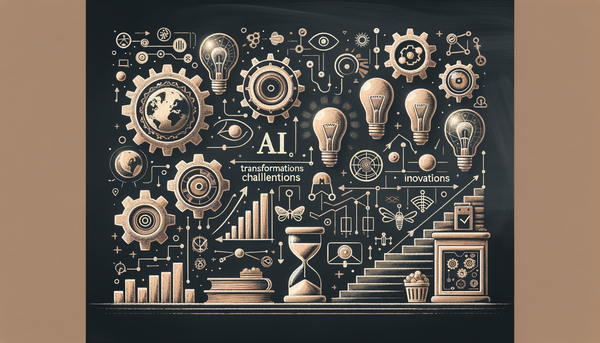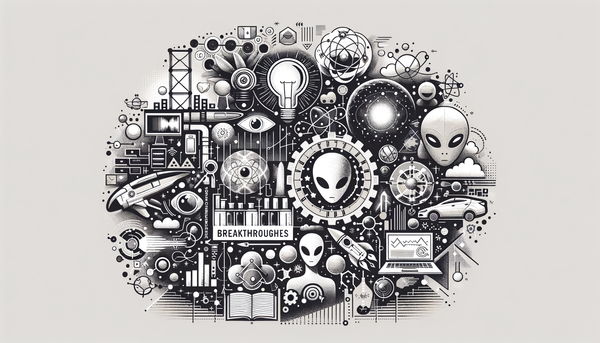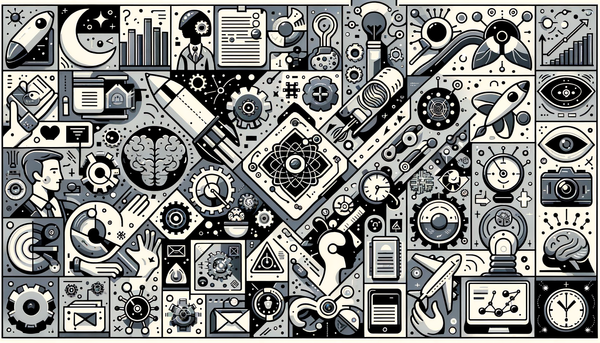GFT Names Rishi Chohan U.S. CEO As It Embarks on AI-Driven Transformation
This comprehensive exploration delves into the multifaceted impact of artificial intelligence across industries—from the stringent regulatory challenges of the EU AI Act and evolving cybersecurity threats to transformative advances in finance and groundbreaking applications in medical training. By examining recent developments in compliance, AI-driven security, innovative financial automation, and healthcare, we provide in-depth insights that illuminate how AI is reshaping the modern world.
Charting the AI Regulatory Landscape: The EU AI Act and Beyond
The unveiling of the EU AI Act heralds a fundamental shift in how organizations operate within the jurisdiction of the European Union. Set to be implemented in phases starting February 2025, this regulation is aimed at ensuring that AI technologies serve the public good without compromising ethical and legal standards—a transformation that is as rigorous as it is essential. The EU AI Act, alongside the forthcoming EU Data Act, establishes precise criteria and processes that organizations must adhere to as the digital landscape undergoes rapid transformation.
Organizations face a steep learning curve in adapting to these requirements. As discussed in an influential article from CIO, companies will need to mobilize cross-functional teams encompassing IT, legal, compliance, and data protection specialists. The guidance outlined by experts including Daniel Andernach of MHP suggests a six-step strategy to develop an agile compliance organization. These steps, ranging from developing a robust compliance strategy to selecting technology platforms for streamlined operations, highlight the importance of strategic planning and interdepartmental collaboration.
This proactive approach is essential in redefining corporate digital responsibility—in other words, making compliance a strategic asset rather than a bureaucratic burden. By leveraging advanced compliance platforms and outsourcing certain tasks to specialized centers, businesses can not only meet statutory obligations but also derive cost efficiencies and create a competitive market advantage.
Given the rigorous demands of the EU regulatory framework, it is a reminder of the diligence required by every organization to integrate legal mandates into their product pipelines. As noted by industry voices, early planning and investment in compliance technologies can yield returns through reduced risks and enhanced market reputation. Furthermore, companies such as those profiled on our AI Governance and Security page underscore the critical need for alignment between governance frameworks and operational protocols.
As Claude Shannon once envisioned, “I visualize a time when we will be to robots what dogs are to humans, and I’m rooting for the machines.” Although not precisely a call for regulatory reform, this quote encapsulates the faith in technology’s transformative potential when harnessed responsibly.
The Evolving Face of Cybersecurity: AI as Both Ally and Adversary
In a dramatic twist to the narrative of AI integration, cybersecurity is emerging as a critical battleground where advanced technology is simultaneously a tool for defense and a weapon for attack. A striking report by KELA Cyber, as detailed by PR Newswire, reveals a 200% surge in cybercriminals embracing AI to orchestrate increasingly sophisticated attacks. This alarming development underscores that the same technologies poised to revolutionize industries can also be manipulated to breach networks, facilitate automated phishing, and even enable deepfake impersonations.
The rapid evolution of cybercriminal tactics—evidenced by a 52% rise in jailbreaking methods in 2024—demands that organizations remain vigilant and adopt state-of-the-art AI-driven defenses. The integration of automated intelligence-based security measures not only deters potential threats but also enables businesses to simulate adversarial tactics, thereby reinforcing their cybersecurity posture.
“We are witnessing a seismic shift in the cyber threat landscape.”
— Yael Kishon, AI Product & Research Lead, KELA Cyber
Such proactive strategies are not merely reactive countermeasures; they also serve as the cornerstone for building secure and resilient digital infrastructures. Companies must prioritize thorough employee training, ongoing monitoring of emerging threats, and the adoption of AI-enabled threat detection systems. Organizations featured on our Cybersecurity & Healthcare Innovations page are already spearheading such initiatives, ensuring that security evolves hand-in-hand with technological progress.
In the realm of cybersecurity, the dual-edged nature of AI calls for a balanced perspective. While cybercriminals exploit vulnerabilities through customized threats like WormGPT and FraudGPT, enterprises must harness AI to create agile and adaptive defenses that match the sophistication of modern attacks. This delicate interplay between offensive capabilities and defensive resilience is rapidly becoming the defining characteristic of our digital era.
Financial Transformation: CFOs and the AI-Driven Revolution
The world of finance is undergoing an unprecedented metamorphosis as artificial intelligence takes center stage. Deloitte’s launch of “AI Advantage for CFOs” symbolizes a seismic shift in how financial operations are envisioned and executed. Developed in collaboration with technology giants such as Amazon Bedrock and Anthropic, this advanced AI analytics platform is set to redefine the traditional role of the Chief Financial Officer by automating financial processes and delivering strategic insights.
The platform’s ability to extract data from varied sources—be it structured data, unstructured documents, images, audio, or video—enables finance teams to move beyond mere number crunching. Instead, they are equipped to formulate strategies based on real-time insights, thereby driving improvements in forecasting, planning, and decision-making. The case of Volkswagen Group Argentina, one of the inaugural clients, vividly illustrates the transformational potential of AI in enhancing operational efficiencies and uncovering new profit pools.
This innovative approach is complemented by Deloitte’s strong commitment to robust data security and trustworthy AI practices through its Trustworthy AI™ framework. Investments surpassing $2 billion in AI education initiatives, such as the Deloitte AI Academy™, highlight the immense focus on upskilling the workforce to better navigate the AI revolution.
However, the financial sector is not the only arena poised for a reinvention. A recent analysis by Bank of America, featured on CNBC, underscores a similar transformation in technology adoption within the financial industry. The bank’s bold double upgrade for Cloudflare—a cybersecurity company with a unique approach to integrating AI—demonstrates the growing recognition that AI-driven security isn’t just a defensive mechanism but an essential catalyst for sustainable growth.
Madeline Brooks, Bank of America’s analyst, outlined that Cloudflare’s blend of advanced network security and AI functionalities positions it as a standout player, with notable expectations for compounded growth over the next several years. This narrative dovetails with Deloitte’s initiative, reinforcing the idea that CFOs must embrace AI not only to streamline operations but also to safeguard against evolving cyber threats.
On our CFOs Embracing the Future with AI page, we explore how these technological advances enable financial leaders to stay ahead of the curve—transforming challenges into competitive advantages. As Satya Nadella famously remarked, “We are entering a new phase of artificial intelligence where machines can think for themselves,” a sentiment that encapsulates the incredible potential and transformative impact of AI on the financial landscape.
AI in Legal and Contractual Frameworks: A New Benchmark in Efficiency
Beyond regulatory compliance and security measures, AI’s influence is making impressive inroads into legal operations. DraftWise’s recent achievement in establishing a ‘Category Standard’ with its upgraded AI contract review has redefined the benchmarks in legal technology. Although detailed specifics of this transformation might not be as widely publicized as other AI developments, the implications are profound.
By harnessing AI to streamline the review and management of contracts, organizations can drastically reduce time expenditure and enhance accuracy. This method not only mitigates human error but also ensures that legal processes remain nimble and adaptable in an environment where regulations and business conditions frequently change. While some might have previously viewed legal tech automation as a far-off concept, the reality is that innovative companies are already realizing significant efficiencies and improved risk management.
The move towards integrating AI platforms in legal operations resonates with broader themes on our Solving AI Adoption: Challenges and Innovations page. As more industries pivot towards automation, it becomes increasingly clear that digital transformation is about more than just efficiency—it’s about creating a resilient framework that adapts to the rapid pace of change.
By setting new standards in contract review and legal processing, AI is positioning itself as a key enabler of agility in regulatory compliance, risk management, and even innovation in business models. These advancements not only simplify operational complexities but also empower legal teams to focus on strategic initiatives rather than repetitive tasks.
Revolutionizing Medical Training: The Promise of AI Navigation in Bronchoscopy
In medicine, the impact of AI is being felt in educational and practical applications alike. A groundbreaking study featured in Critical Care Medicine has illuminated how AI navigation can elevate bronchoscopy training for critical-care physicians. In a carefully controlled trial, physicians trained using an AI-guided system outperformed their counterparts who received traditional, expert-led instruction.
The study’s results were striking: the AI-assisted group achieved significantly lower intersegmental time and reduced overall procedure time, indicating that even a brief training session augmented by intelligent navigation can yield remarkable improvements. The reduced need for re-segmentation not only exemplifies AI's potential in optimizing procedural workflows but also hints at broader implications—improving patient outcomes and redefining how medical training is conducted.
Beyond numbers and metrics, this approach points to a future where AI becomes a trusted guide in clinical settings, allowing emerging physicians to gain proficiency more rapidly while reducing the margin for error. In this context, the integration of AI in medical training isn't just a matter of efficiency—it’s a critical evolution in the way lifesaving procedures are taught and executed.
Anecdotally, the enthusiasm for such AI-driven methodologies has grown steadily. Many leading practitioners have acknowledged that the infusion of AI into training regimens has the potential to standardize learning outcomes, ensuring that even junior physicians can benefit from the collective expertise embedded within advanced algorithms.
As healthcare systems worldwide face increasing demands, the incorporation of AI into medical education and practice heralds a transformative future in patient care. For further details on how AI is driving change in the healthcare sector, readers can explore related insights on our Healthcare Innovations page.
Interdisciplinary Synergies: The Convergence of Innovation, Regulation, and Security
The dynamic interplay among regulatory frameworks, cybersecurity, finance, legal operations, and healthcare forms a complex but coherent narrative of the modern AI revolution. Across industries, organizations are harnessing the potential of AI to transform operational models while navigating new challenges such as evolving regulations and sophisticated security threats.
For example, the rigorous compliance processes outlined by the EU AI Act and the data mandates that follow are not mere legislative hurdles but strategic catalysts that push companies to enhance their internal systems. Meanwhile, cybersecurity challenges such as those highlighted by KELA Cyber create an urgent need for innovation in defense strategies. These two seemingly disparate areas—regulatory compliance and cybersecurity—are converging to produce a resilient ecosystem where innovation thrives despite formidable obstacles.
Similarly, finance is witnessing its own paradigm shift with CFOs leveraging AI to drive automation and strategic insights. This is reflective of a broader trend where digital transformation reshapes decision-making processes across boardrooms, ensuring that modern enterprises are well-equipped to handle both opportunities and challenges. The stories of Deloitte’s AI Advantage initiative and Bank of America’s optimistic forecast for Cloudflare serve as powerful indicators of how AI is becoming indispensable in sectors where precision, accountability, and agility are paramount.
Reflecting on these developments, I often recall the sentiment expressed by Jeff Hawkins: “The key to artificial intelligence has always been the representation.” This insight underscores that at the heart of AI’s evolution lies the myriad ways we choose to represent and harness data—whether it’s for enhancing compliance, reconciling financial models, bolstering cybersecurity defenses, or even refining medical procedures.
The unfolding narrative of AI is thus a testament to the power of interdisciplinary synergies. Each sector’s journey contributes to a richer, more interdependent ecosystem wherein the strengths and challenges of one area provide valuable lessons for others. The emergent trends emphasize that collaboration, integration, and forward-thinking strategies are critical if we are to fully realize the transformative potential of artificial intelligence.
Looking Ahead: Building a Resilient, AI-Enabled Future
As we peer into the horizon of technological evolution, one thing remains abundantly clear: the journey of integrating AI into every facet of business and society is far from over. The ongoing developments—from regulatory shifts and cybersecurity reinforcements to financial optimization and medical training innovations—are profoundly reshaping our collective future.
Enterprises that invest in robust AI adoption are better positioned to not only meet statutory and compliance demands but also to secure competitive advantages. It is evident that AI is now a pivotal driver of transformation. Companies that heed the lessons of the EU AI Act, incorporate advanced threat detection technologies, pioneer innovative financial automation, and revolutionize traditional sectors such as legal operations and medical training are well on their way to defining tomorrow’s digital economy.
The journey ahead demands relentless innovation, proactive adaptation, and thoughtful collaboration across sectors. By embracing the challenges head-on and seizing the opportunities provided by AI, organizations can ensure they’re not left behind in a rapidly evolving landscape. Whether you are an executive, a cybersecurity professional, or a clinical educator, the narrative of AI urges us all to look forward with confidence, resilient in the knowledge that today’s investments in data, innovation, and intelligence will usher in a safer, more efficient, and more dynamic future.
For those interested in further exploring this dynamic evolution, our additional AI.Biz updates such as Solving AI Adoption Challenges and CFOs Embracing the Future with AI provide invaluable insights and comprehensive analyses. These resources synthesize expert opinions and detailed case studies, paving the way for a deeper understanding of how AI is reconfiguring every industry it touches.
Further Readings
- The EU AI Act is here. Are you prepared for it? - CIO
- KELA Cyber Finds 200% Surge in Cybercriminals Seeking AI to Launch Attacks - PR Newswire
- Deloitte Launches AI Advantage for CFOs With AWS and Anthropic – Deloitte
- Bank of America Double Upgrades What It Says Is an Underappreciated AI Play - CNBC
- Superior Bronchoscopy Training Outcomes With AI Navigation - Physician's Weekly




